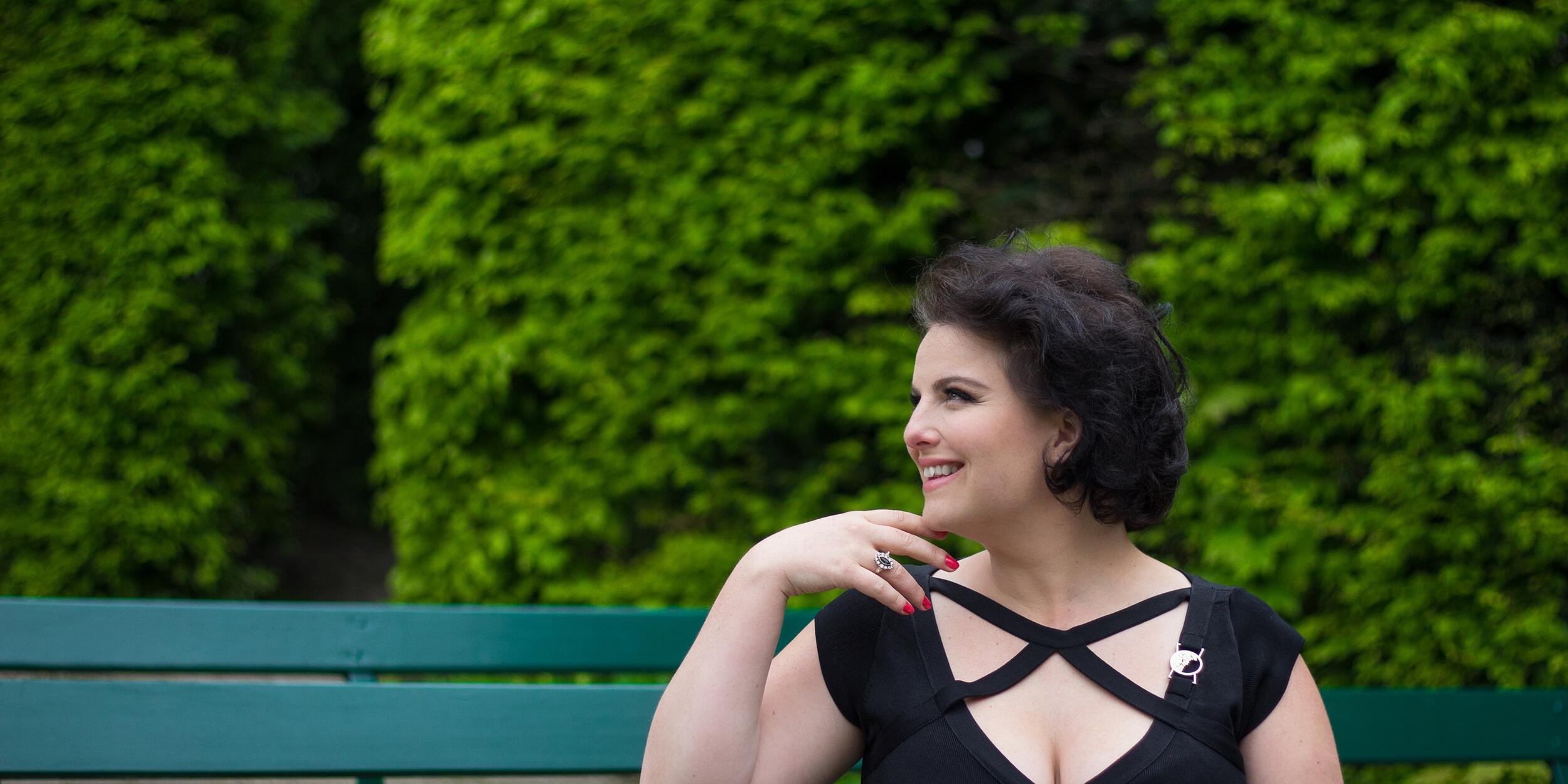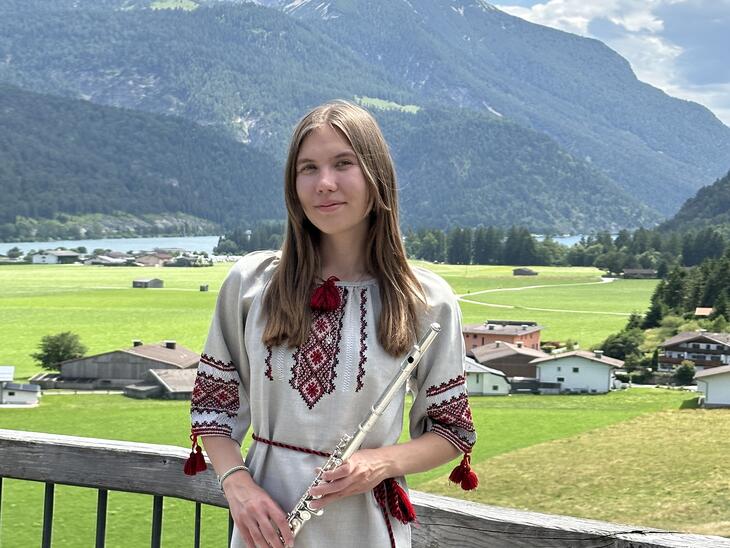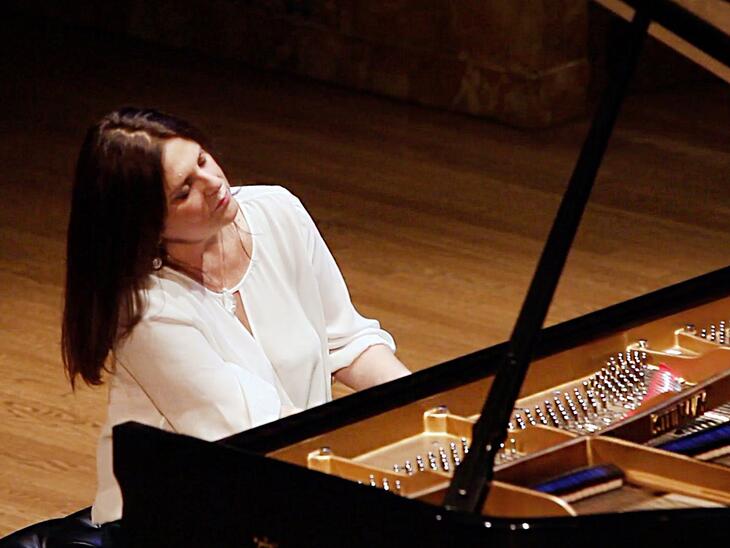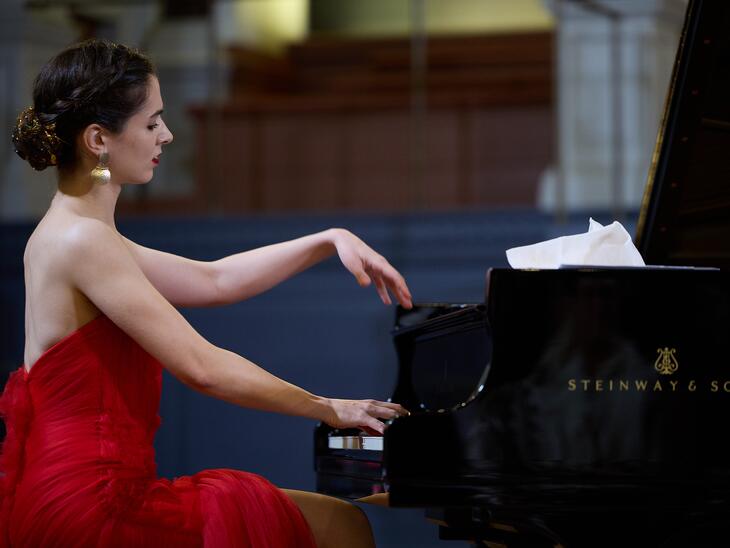In your current artistic project "Kein leichtes Mädchen", you have dedicated yourself to a very sensitive topic: the taboo subject of sex work, with the simultaneous omnipresence of "sex". The play can be seen at the Salzburg Schauspielhaus from May. In it, you address questions such as "where does one's freedom end" and "where does it have to end" and how do people feel who perform self-determined "psycho-hygienic work", which is largely unreflectedly tabooed by society and equated with human trafficking and rape. How did this project come about?
The play is a monologue that I have expanded with art songs from Franz Schubert to Richard Strauss. The plot is about Felicitas, a classically trained singer and single mother of two children. She is a sex worker and is trying to make her comeback as a singer with a song recital. You might immediately object, why art songs about sex work? For me, it was about this apparent contrast between the celebrated art song and the stigmatised sex work. I find that incredibly exciting. The evening itself should serve as a basis for discussion. On topics such as self-determination, human rights and the stigmatisation and exclusion of certain groups of people. I also always had the idea of reorganising the classic song recital. I noticed, as I'm sure all my colleagues have noticed, that our audience is getting older and older. Young people very rarely go to Schubert's Winterreise. I think that's a shame, as many classical songs are incredibly contemporary. But I can also understand it, because the topicality of the songs is not immediately obvious. I therefore thought that a form of performance should be developed that would also bring people of my generation, or more people in general, to a Lieder recital. I applied for a scholarship in Tyrol, a bit like a wish list to the Christ Child, with the plan to rethink, even revolutionise the lieder recital. I was delighted when I was accepted for the scholarship, but then it wasn't so easy to develop a concrete plan. A cabaret artist friend of mine then said: "Do something about sex, that always works". Then I remembered the experiences I'd had over years of commuting from Innsbruck to Salzburg at five in the morning. I used to walk past the Südring in Innsbruck every day, where there was still a street prostitution centre back then. I greeted the women who were waiting for men on the Südring. The women greeted me back and we quickly struck up a conversation. The women's jobs are easy to tell. We all know what they do. But who are the people behind the job? Do they have families? Do they have children? What are their hobbies? Why do they do this particular job and not another? I went in search of them. At first it was only women who were willing to tell me their story. But for a long time I didn't know exactly what I wanted to do with them. In the meantime, I have interviewed well over 100 people in a project period of one and a half years. One key moment was a conversation with a woman from Hamburg. She showed me a list of signatures with the title "The whore should go" and told me about her seven-year-old child, whose birthday party nobody wanted to come to because he was a whore's child. Of course, the child didn't understand and wanted to know from her mother what a whore's child was. It was soon like a witch hunt. This story stayed with me and I tried to understand how such a thing could happen. That's how my plan to bring this topic to the stage came about. I told my director Thomas Lackner about it, saying "Thomas, I have to tell this story on stage, but I might get booed and go down with flags flying". He replied to me - and I'll never forget it: "If we're going down, we're going down together. We'll bring it to the stage." So I started writing the monologue and choosing the songs. I believe that difficult subjects need humour to make them bearable. There are just incredible stories that are worth telling. A sex worker who told me that she had problems getting a place in a kindergarten because her child would allegedly transmit Aids. Or women whose car tyres were slashed, neighbours who spat at a sex worker in the hallway even though she used to feed the cats in their absence, and so on. After these stories, I thought to myself, we don't need to talk about the profession, but about humanity, about the right to judge others, about moral standards. That really surprised and moved me. I hadn't expected it. So the main problem in this job is not the customers and the brothel owners, but the neighbours, family, friends and social environment.
The next step was to choose the performance venue. Thomas wanted to perform the piece in a chamber music hall - in a glamorous setting. But that wasn't so easy. People didn't want the project or the halls were so expensive that I couldn't afford it. The funniest answer was: "Don't call us, we'll get back to you." So Thomas and I went to the Treibhaus, even though classical music is not normally on the programme there, and I ended the presentation of my project with the words: "Nobody wants it." And the good Norbert Pfeifer grinned and said: "When do you want to play?" The play was subsequently picked up by the Kronenzeitung, the Tiroler Tageszeitung and the ORF, which was very fortunate. It was a long way from the idea to the performance in front of an audience, with lots of rejections, lots of trips, lots of emails and conversations, organisational matters - these are things that you're not necessarily prepared for as an artist and that you learn and understand very little about during your training. What made me personally happy was that the state of Tyrol and the city of Innsbruck helped us a lot financially. And my personal highlight: the poster featured our main sponsor, the ORION sex shop, which is very supportive of sex workers, the Catholic Women's Movement and the Inner Wheel Club, among others. Women's power, after all.
Until the end, I was prepared for the play to be booed. Nevertheless, I wanted to tell the story. I was prepared for the performances to be disrupted, even though there is nothing obscene or sexual to be seen or heard in these evenings. It's not about sexual practices or anything like that. I hold up a mirror to all of us, including myself. For example, I ask the question: when is work not normal? The play addresses how the decision to do sex work came about - often for very pragmatic reasons. It's also about how and why people try to keep this work a secret. So that their children are not at a disadvantage, so that they can keep their flat, so that they can pay their bills. That also says a lot about society.
What was the reaction from the audience in Tyrol?
We had a standing ovation! I was very surprised. I'm curious to see how the Salzburg audience will receive the play. And of course there's always the fear that the audience will think it's terrible.
How did you personally feel about the play on stage? Were you also worried that you were making yourself vulnerable in new territory with a sensitive subject?
There were several aspects that gave me confidence. What helped me a lot were the dress rehearsals, which were attended by some of my dialogue partners, sex workers and social workers. The text was therefore well scrutinised by the people involved. I got a lot of feedback and was sure that I had done my research well. I also had rehearsals in front of colleagues from singing and acting, which ultimately gave me professional confidence. Very important for me was the support of my husband Florian, who gave me the courage to deal with this topic and stood behind me, and the help of Christine Nagl, a social worker and activist from Salzburg, the sex worker Thorja von Thador and the information and advice centre for sex workers in Tyrol, who were all a great help throughout the entire process with their perseverance and activity. Without them, I wouldn't have got this far and this play wouldn't have been shown this year in Salzburg and at the Radiokulturhaus in Vienna and next year in Ingolstadt. These were all factors that encouraged me. The role itself also helped, as the character is "beside himself" from the start. The difficulty was and still is that I have to do both the speaking and the singing without a microphone and that is very exhausting over two hours. Especially when you have to sing Strauss, Berg and Rachmaninoff and then switch back to speaking. The most important thing for me was that I was talking to the people who work in sex work and not about them. That's what I wanted to get across. The people who work in this profession are neither stupid nor uneducated, they can be found in all professions and educational backgrounds. Ultimately, it was more important to me that the people I spoke to about sex work saw themselves in the play and agreed with the content than that the audience liked it. Thomas Lackner was always there for me during the rehearsal phase. That was a great gift and happiness for me. We often spoke on the phone after rehearsals because he could think of something I could do better. The play wouldn't be what it is without Thomas. I will always be grateful to him for that.
Is it the privilege of art or even the only accepted means of addressing sensitive topics?
If you want to take up the topic journalistically, for example, you need sources and evidence. There are women in the profession who would perhaps also do this, but many have to fear disadvantages for themselves and their families, so it becomes difficult. Sex workers have to protect their private lives. Sad, but true. In this respect, art is predestined for such topics, because art is allowed to say many things without having to fear legal consequences. For me, the time when art was only allowed to be beautiful is long gone. For me, art also has an obligation to address unpleasant things. Of course, not every artist has to do that. Perhaps it is also important that the "1000th Figaro" is performed (social criticism can also be applied there), perhaps it is also the task of art to make things beautiful, to cushion and entertain, but it is not necessarily my way. I don't want to divide it into positive and negative. I believe that as human beings we can't just stand next to the problems of our time or society, regardless of which professional group we belong to.
How did you find your passion for song? What are the special features of art song?
Songs tell the great stories of our time in just a few minutes. I love telling these small and big stories, performing light and heavy melodies, evoking fleeting or long-lasting emotions in the audience and myself. An art song is very often political. Sometimes so is an opera, but often there is no demanding libretto. I have always envied the lyricism of actors and I find something similar in art song. The lyrics are not old-fashioned, they apply to today's realities. For me, the song can express so much, tell stories, similar to a pop song.
How did you get into acting?
By chance. I helped rehearse a theatre production that won the Austrian Music Theatre Prize. That's how I met Thomas Lackner and we subsequently worked on a project together, Ilse Aichinger's "Spiegelgeschichte". I enjoyed it so much that I wanted to try my hand at this subject further. I am delighted that "Kein leichtes Mädchen" always makes the audience laugh. The play allows interaction with the audience. It wasn't planned that way, but I can see that it works and it's a lot of fun. I've never managed to do that in this form with a classical song recital before. I have the feeling that these moments with the audience take the "heaviness" out of classical music, perhaps even the perfectionism, and that I can reach more people with it. In recent performances, I have seen typical concert-goers in well-fitting suits or evening dresses as well as people in jeans and everyday clothes, typical theatre-goers, but also young people. This mix is great.
What advice can you give young students from your previous experiences?
Just do it. Don't think about whether a project will succeed or fail. Thinking about whether the audience will like it is the wrong thing to do. You have to do what you are convinced of. Of course, it is our duty to prepare programmes well and to research them thoroughly. We shouldn't spread half-truths or deliver poor quality programmes. But in the arts, I have no interest in telling anyone my opinion or making judgements about right and wrong. I don't see that as my job. My stage character Felicitas asks questions and tells her story. But I don't want a "result" along the lines of: this is what you should think now. The audience can think for themselves and form their own opinion. I want to address topics, and if I encourage discussion, I'm all the happier for it. I sometimes observe it during breaks or get feedback like "We've been talking about this topic all evening." That's wonderful.
You have a wide range of interests, are very close to nature, were the voice of many students and studied property management as well as art. How did you find your calling? What were the most formative moments in your artistic development?
I found my way to art song very early on, opera was never my cup of tea. Although there is of course a lot of great music: Verdi, Hindemith, Wagner, ... My presidency of the university student body, which forced me to think and act politically and make decisions, probably influenced me. The distance to art when I studied property management probably also helped me. I stepped out of my "bubble" and learnt how people think about art who have nothing to do with it and how you could approach them to get them to go to concerts after all. Another huge advantage of this training is that nobody can tell me so quickly whether something will work financially. If you have done risk calculations for a building site, you can also calculate artistic projects. I also learnt a lot of practical things, for example about lighting and technology. More is usually possible than you think at the start of a project or what others think (laughs).
Decisions are often snapshots. I stopped singing for a year and thought that I didn't want to do it anymore. I earned better in the property industry and a lot of things were easier, more regulated. I only sang for myself at home until I received a call from a former musician colleague who asked me to stand in for a colleague who was ill at short notice. It was Maler's 4th Symphony and repertoire that I had already rehearsed. I did it, had no pressure and was able to sing well. More concerts followed and so I stayed with singing, albeit as an independent artist with my own programme.
When you think back to your studies, what do you remember most fondly?
There were many wonderful moments, the time at the ÖH, but above all my Master's programme with Thérèse Lindquist and Christoph Strehl, who both understood that I had to make songs. I also have Thérèse to thank for the fact that I still work with the pianist Vyara Shuperlieva today. During our first singing lesson, Christoph Strehl said: "So, song? You don't earn any money with that." He was not entirely wrong. But he supported me anyway. That meant a lot to me. These three people, Thérèse, Christoph and Vyara, really encouraged my passion. I am very grateful for that.
What are your hopes for your next artistic projects? For the future of art?
Courage above all. We all need courage. The audience, us artists, simply everyone. The world is changing. We can feel it. Our whole world is changing rapidly and we, each and every individual and we as a society, are deciding which direction to take. It takes courage to take the right path and not the easy one, and I hope that we make good decisions in the future. I hope that we talk to each other more again, without mobile phones and constant availability. I hope that we take the time to talk to each other. That we listen to each other, even if we disagree. We should try to show more understanding for our counterparts and try to understand why other people think the way they do.
---
Elisabeth de Roo studied Lied and Oratorio at the Mozarteum University Salzburg and Real Estate and Facility Management at the University of Applied Sciences in Kufstein. From 2015 to 2018, she worked as an expert for the Agency for Quality Assurance and Accreditation Austria (AQ-Austria). Prior to this, she headed the Career Centre at the Mozarteum University, was Chairwoman of the Austrian Students' Union at the Mozarteum for six years and a mandatary of the Federal Representation of the Austrian Students' Union. Her favourite way to study monologues and roles is on long hikes through the forest, far from the beaten track, with her two dogs. Her play "Kein leichtes Mädchen. Käuflicher Liederabend" she dedicates herself to a sensitive topic and tries to encourage people to discuss it.
Elisabeth de Roo made her artistic debut as Susanna in "Sancta Susanna" by Paul Hindemith under the direction of Hans Graf. David Garett booked her as a singer for a TV appearance on ORF II, whereupon she appeared several times as a soloist on ORF. She sang Mahler's 4th Symphony under Massimiliano Caldi in Verona, Bolzano, Kaltern, Toblach, Innsbruck and Kufstein, and Wolfgang Mitterer engaged her for the world premiere of his piece "Couleurs De La Vent" for soprano, ensemble and soundtrack. She sang the aria of Elsa in Richard Wagner's "Lohengrin" under Nayden
Todorov in the Bulgarian Hall, Sofia 2022. In the monologue after Ilse Aichinger's "Spiegelgeschichte" she made her debut as an actress in 2021 under the direction of Thomas Lackner. The classical art song is the singer's great love. She received the Federal Performance Scholarship for Excellence and the Music Theatre Prize 2021 for the project "Dreigroschenoper" - best off-theatre production (musical rehearsals and vocal coaching). In 2023, "Kein leichtes Mädchen. Käuflicher Liederabend" premiered at the Treibhaus in Innsbruck. In 2024, the play was revived in Innsbruck and Tyrol and can be seen from 10 May to 22 June 2024 at the Schauspielhaus Salzburg and the Radiokulturhaus in Vienna and in 2025 in Ingolstadt.




